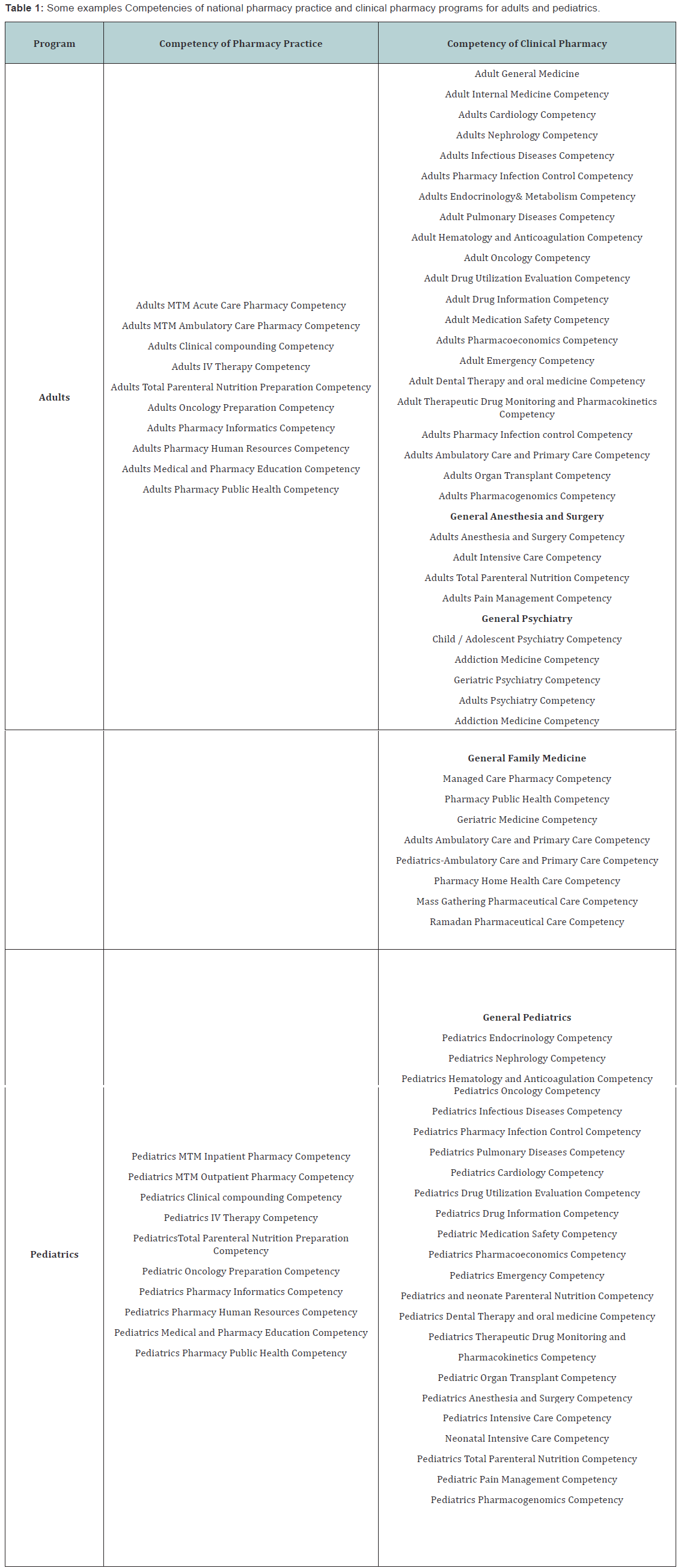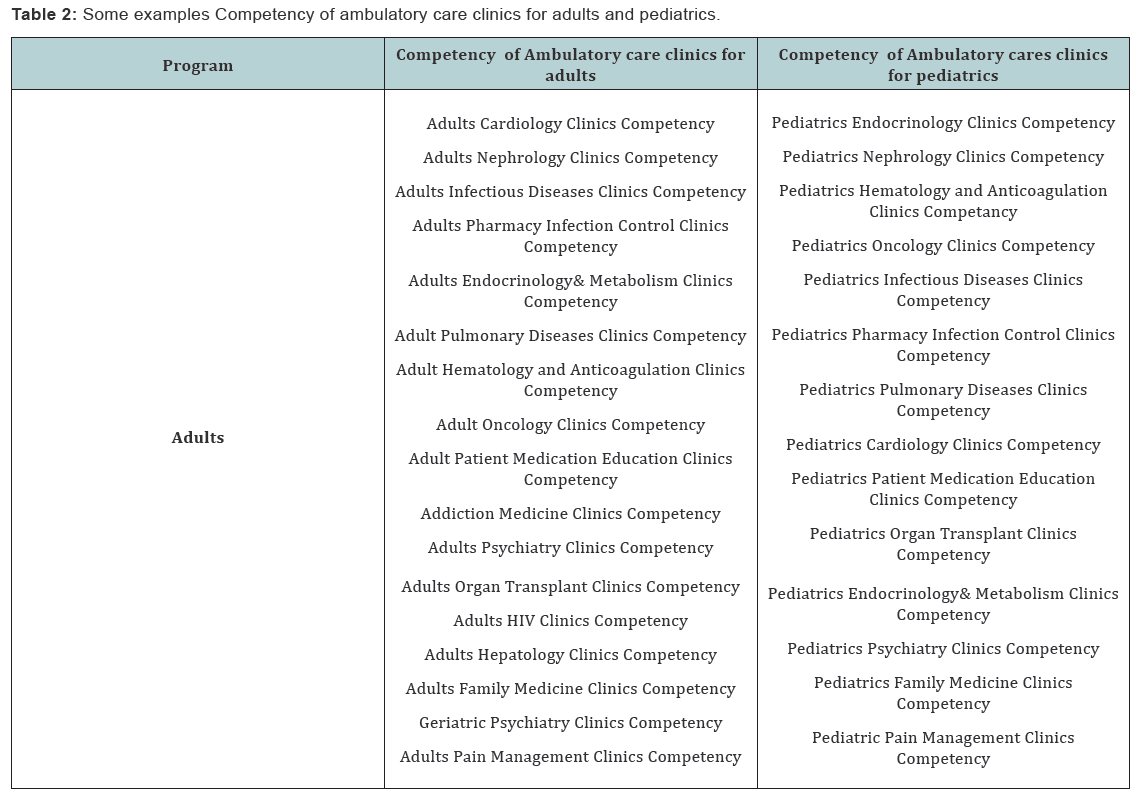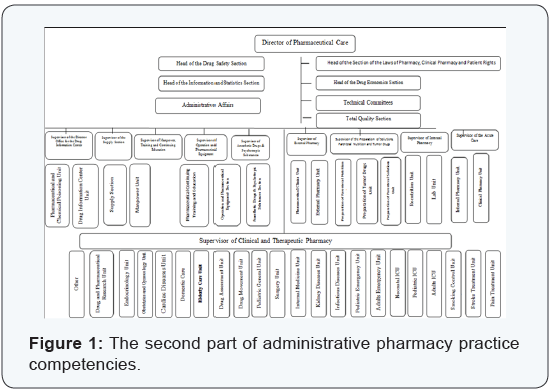National Pharmacist Competency System at Ministry of Health Hospitals in Saudi Arabia
*Yousef Ahmed Alomi
National Clinical Pharmacy and Pharmacy Practice, Saudi Arabia
Submission:May 07, 2016; Published:June 29, 2016
*Corresponding author: Yousef Ahmed Alomi, The Past General Manager of General Administration of Pharmaceutical Care Head, National Clinical Pharmacy and Pharmacy Practice Head, Pharmacy R & D Administration, Ministry of Health, P.O.BOX 100, Riyadh 11392, Riyadh, Saudi Arabia, Tel: +966504417712; Email:yalomi@gmail.com
How to cite this article: Yousef A A. National Pharmacist Competency System at Ministry of Health Hospitals in Saudi Arabia. J of Pharmacol & Clin Res. 2016; 1(3): 555563. DOI: 10.19080/JPCR.2016.01.555563
Abstract
National Pharmacy Competency System is unique program founded at Ministry of Health in Saudi Arabia. The program is a part of the general administration care strategic plan. The program consisted of three categories, including a general core of general pharmacist competency and clinical pharmacist competency. In addition to pharmacy management skills competency, and advance with different specialization of clinical pharmacy competency. The pharmacy competency system should perform at least annually. It is very hard to find a study to examine the extent application of pharmacist competency. Most of the works of literature discussed in single or one section of pharmacy practice. This system improves pharmacy practice, with the emphasis on drug therapy monitoring, prevent a drug related problem, and improve patient outcome therapy.
Keywords: National; Pharmacist Competency; Pharmaceutical Care; Ministry of Health; Saudi Arabia
Abbreviations: MOH: Ministry of Health; GAPC: General Administration of Pharmaceutical Care; ACC: American College of Clinical Pharmacist; IPF: Internal Pharmaceutical Federation; PSI: Pharmaceutical Society of Ireland
Introduction
Ministry of Health (MOH) in Saudi Arabia established general strategic planning for health care system [1]. This plan should apply to more 270 hospitals, and all medical cities [1]. All general administrations at MOH should establish their pharmacy strategic plan based on that. General Administration of Pharmaceutical Care (GAPC) at Ministry of Health established a general strategic planning of pharmaceutical care for all hospitals and primary care centers [2-3]. Also; GAPC founded some measurement indicators to follow the implementation of this plan; pharmacist competencies system was one of them. Pharmacy human resources development is one of the primary objectives of the general pharmacy strategic plan; a pharmacy competency is an excellent indicator used for follow-up pharmacy resources implementation.
In the literature, they defined the competency as “having the requisite ability or qualities” [4]. The statement applies in pharmacy practice and clinical pharmacy specialties [5-6]. Pharmacist competency is one of the methods to improve pharmacy practice and pharmacy total quality management. It needs to require the international standard of Joint Commission of Hospital Accreditation and local standards of Saudi center of health care accreditation.
Benefit of Pharmacy Competency
Pharmacy competencies improve pharmacy practice and clinical pharmacy skills. A study in the United state of America founded 88% of responders pharmacist agreed that the competency program was informative and supportive of their daily patient care activities [7]. Another study in Croatia established that is Competency Development and Evaluation significant differences in the pharmacy practice with emphasis on patient consultation, monitoring drug therapy, medicine information, and patient education [8]. Also, the authors found from the study conducted in the UK; that is competencies improved significantly from baseline; it was aspects of medication history taking; medication management; identification, documentation and resolution of drug-related problems; appraisal of therapeutic options; and communication with doctors and nurses [9].
Pharmacy Competency Implementation in Saudi Arabia
The pharmacist competency consisted of three parts, the first part of basic requirements for all pharmacists hold the Bachelor of Pharmacy or Doctor of Pharmacy (Pham D, and practice competencies as the general pharmacist. This tool based on American College of Clinical Pharmacist (ACC), The National Association of Pharmacy Regulatory Authorities in Canada, The Pharmacy Council of New Zealand, Internal Pharmaceutical Federation (IPF), and Pharmaceutical Society of Ireland (PSI) [6,10-13]. The second part of administrative pharmacy practice competencies including but not limited to the following; director of the pharmacy, clinical manager, staff pharmacist, compounding sterile preparation, emergency management, fire safety, infection control, information management, medication safety, and patient counseling (Figure 1) [14]. The third part of the specialized requirement based on their type of practice. (Tables 1 & 2) [15-20].



In the international literature; one study conducted in Thailand, the author, found the highest scoring of attitude toward pharmacy competencies was a providing of pharmaceutical care and drug use plans in the community among hospital pharmacists [21]. Another local study conducted in Saudi Arabia about Competency of Metered-Dose Inhaler Use with community pharmacist; the authors found very wide range 5-100% competencies of the elements [22]. The National Pharmacist Competency System is the first apply in Saudi Arabia and second in the Gulf and the Middle East countries [23]. The author is not familiar with any kinds of literature, or published studies measure the extent applications of this system. The system started in 2013 and distributed to overall Ministry of Health hospitals, the measurement of pharmacist competency should do on an annual basis. In 2015, the author and his team at GAPC converted into an electronic form through monkey survey on MOH website [24].
Conclusion
National pharmacist competency system is new system founded at MOH hospitals; the system implementation improves pharmaceutical care delivered to the patients. It prevents drug misadventures, improve patient quality of life and raise patient satisfaction on health care system.
References
- Statistics Book – Statistical Book for Year (2014). Ministry of Health Portal, Kingdom of Saudi Arabia.
- Alomi YA, Alghamdi SJ, Alattyh RA (2015) Strategic Plan of General Administration of Pharmaceutical Care at Ministry of Health in Saudi Arabia 2012-2022. J Pharm Pharm Scien 1(3): 1-8.
- Alomi YA (2015) National Pharmacy Practice Programs at Ministry of Health in Saudi Arabia. J Pharm Pharm Scien 1(2): 17-18.
- Kvancz DA (2006) A distinctive competency. Am J Health Syst Pharm 63(9): 819-828.
- Marshall JM, Adams JP, Janich JA (1997) Practical, ongoing competency assessment program for hospital pharmacists and technicians. Am J Health Syst Pharm 54(12):1412-1417.
- John MB, William AM, Anne PS, Christopher WC, Laura A, et al. (2008) Clinical Pharmacist Competencies. Pharmacotherapy 28(6): 806-815.
- Tu T Tran, Shareen El Ibiary, Robert Tindula, Neepa Rai, Austin Nguyen (2013) Unique pharmacist competency program at community-based, teaching hospitals. Journal of Hospital Administration 2(3): 119-125.
- Arijana Mestrovic, Zivka Stanicic, Maja Ortner Hadziabdic, Iva Mucalo, Ian Bates, et al. (2012) Individualized Education and Competency Development of Croatian Community Pharmacists Using the General Level Framework. American Journal of Pharmaceutical Education 76(2): 1-8.
- Ian Coombes, Minyon Avent, Lynda Cardiff, Karen Bettenay, Judith Coombes, et al. Improvement in Pharmacist’s Performance Facilitated by an Adapted Competency-Based General Level Framework. J Pharm Pract Res 2010; 40: 111-118.
- Professional Competencies for Canadian Pharmacists at Entry to Practice (2014). National Association of Pharmacy Regulatory Authorities (NAPRA) Board of Directors p. 1-28.
- The Safe Effective Pharmacy Practice Competence Standards for the Pharmacy Profession (2011). The Pharmacy Council of New Zealand p. 1-28.
- A Global Competency Framework for services provided by pharmacy workforce (2012). Internal Pharmaceutical Federation (FIP) p. 1-13.
- Core Competency Framework for Pharmacists (2013). Pharmaceutical Society of Ireland (PSI) p. 1-28.
- The Leadership Competency Framework for pharmacy professionals (LCFP) (2011). Royal Pharmaceutical Society of Great Britain p. 1-60.
- Gallagher M (1999) Home care pharmacist competency assessment program. Am J Health Syst Pharm 56(15): 1549-1553.
- National Competency Framework for Pharmacists Working in Cancer Care (2015). National Cancer Control Program p. 1-23.
- O Connell MB, Korner EJ, Rickles NM, Sias JJ American College of Clinical Pharmacy (2007) Cultural competence in health care and its implications for pharmacy. Part 1. Overview of Cultural competency and pharmacy education. Pharmacotherapy 27(7): 1062-1079.
- O Connell MB, Rickles NM, Sias JJ, Korner EJ American College of Clinical Pharmacy (2009) Cultural competency in health care and its implications for pharmacy. Part 2. Emphasis on pharmacy systems and practice. Pharmacotherapy 29 (2): 14e–34e.
- O Connell MB, Rodriguez de Bittner M, Poirier T, Karaoui LR, Echeverri M, et al. American College of Clinical Pharmacy (2013) Cultural competency in health care and its implications for pharmacy. Part 3A. Emphasis on Pharmacy Education, Curriculums, and Future Directions. Pharmacotherapy 33(12): e347-e367.
- O Connell MB, Jackson AN, Karaoui LR, Rodriguez de Bittner M, Chen AM, et al. American College of Clinical Pharmacy (2013) Cultural competency in health care and its implications for pharmacy. Part 3B. Emphasis on Pharmacy Education Policy, Procedures, and Climate. Pharmacotherapy 33(12): e368–e381.
- Maitreemit P, Pongcharoensuk P, Kapol N, Armstrong EP (2008) Pharmacist Perceptions of New Competency Standards. Pharm Pract (Granada) 6(3): 113-120.
- Issa Saad Ali Al Qahtani,Turki Mohammed Almoteb, Yaser Mohammed Al Worafi (2015) Competency of Metered-Dose Inhaler Use among Saudi Community Pharmacists: A Simulation Method Study. RRJPPS 4(2): 37-31.
- Jewesson PJ (2011) Professional Competencies for Qatar Pharmacists at Entry to Practice. College of Pharmacy, Qatar University p. 1-11.
- Pharmaceutical Care General Department – Electronic Forms (2016) Ministry of Health Portal, Kingdom of Saudi Arabia.







